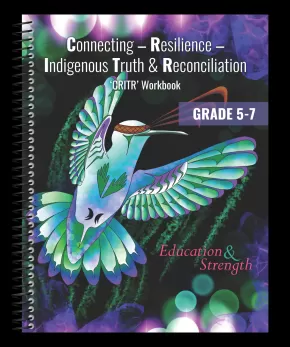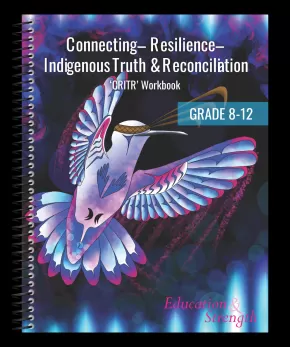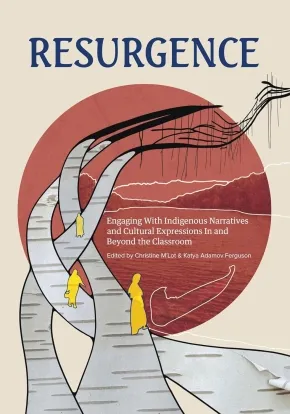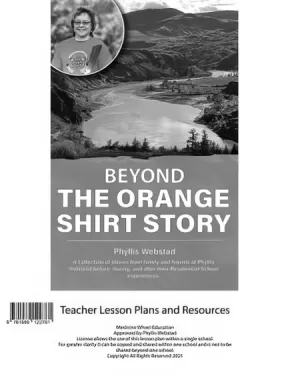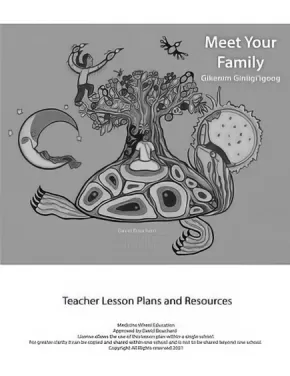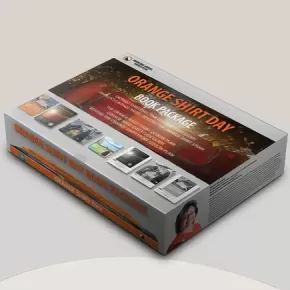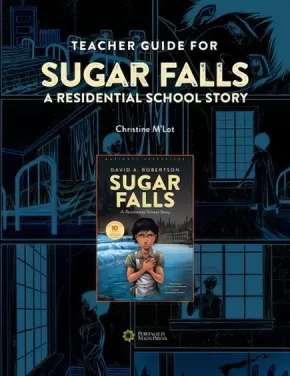
Social Studies Resources
1
-
15
of
32 Results;
Sort By
Go To
of 3
Renewal: Indigenous Perspectives on Land-Based Education In and Beyond the Classroom
$37.00
Artists:
Format:
Paperback
Text Content Territories:
Indigenous Canadian;
ISBN / Barcode: 9781774921678
Synopsis:
Synopsis:
A guide that provides ideas and action steps for bringing Indigenous perspectives and philosophies of land-based learning into professional practice, in the classroom and beyond.
Renewal, the second book in the Footbridge series, guides K–12 educators in bringing Indigenous voices and the philosophy, principles, and practices of Indigenous land-based education into their teaching. This text encourages educators to:
- respectfully renew their own relationships with land directly engage students with the land, no matter where they are located
- guide students in learning through observation, listening, and discussion and to take action in response
- honour diverse ways of knowing and being
- understand historic injustices and engage with the contemporary Land Back movement
Through critical engagement with diverse written and visual works created by Indigenous leaders, land defenders, scholars, and Knowledge Keepers, experienced educators Christine M'Lot and Katya Adamov Ferguson support readers in connecting with Indigenous perspectives on land and water. They offer guidance on bringing Indigenous works into the classroom, including concrete ways to facilitate discussions around land-based topics, advice for land-based activities, and suggestions for how students can engage with these topics through inquiry learning.
In this resource, you will find:
- prompts for individual reflection and group discussion
- valuable concepts and methods that can be applied in the classroom and beyond
- practical action steps and resources for educators, parents, librarians, and administrators
Use this book as a springboard for your own learning journey or as a lively prompt for dialogue within your professional learning community.
Reviews
"Renewal lays out a simple and practical approach to land-based education. It works from the premise that land-based education is not simply “taking the classroom outside,” but is about "education on the land, about the land, and from the land.” The spiritual foundation of earth-based cultures is about living in your place as one small, equal part of the land (land being the entirety of air, earth, water, living beings, and spirits), a foundation common to most Indigenous cultures on this planet. I hope that others adopt it in their journey to become more holistic educators and maybe even make a positive difference in shaping how we humans interact with the land." — Dr. Garry Merkel, Director, Centre of Indigenous Land Stewardship, The University of British Columbia
Educator & Series Information
For use with grades K to 12.
This book is part of The Footbridge Series. This series aims to bridge curricular outcomes with Indigenous-centered content and perspectives from across Turtle Island. Like a footbridge, this series is intended to provide a path between Indigenous worldviews and the classroom, engaging differences, including tensions, and highlighting the importance of balance, all while helping teachers integrate Indigenous perspectives into multiple disciplines within the K-12 education system.
Contributions by Nicki Ferland, Peatr Thomas, Tyna Legault Taylor, Shannon Webb-Campbell, Tasha Beeds, Sonny Assu, Shalan Joudry, Tricia Logan, Dakota Bear, Shirli Ewanchuk, Dan Henhawk, Réal Carrière, Hetxw'ms Gyetxw Brett D. Huson, Reanna McKay (Merasty)
Photographs by Inuksaq Angotingoar, Makayla Aupaluktuq, Brendan Kingilik, Carina Kingilik, Kyle Lareau, Quin Mikkungwak, Narkyagik, Kaylee Rumbolt, Marissa Scottie, Nathan Snow, Connor Tagoona-Niego, Koen Tapatai, and Shelly Tunguaq
Additional Information
224 pages | 7.00" x 10.00" | Paperback
The Seventh Direction Teacher Lesson Plan
$7.99
Artists:
Text Content Territories:
Indigenous American; Native American; Sioux; Lakota; Indigenous Canadian; First Nations; Sioux; Lakota;
ISBN / Barcode: 9781778540325
Synopsis:
Synopsis:
A teacher lesson plan that accompanies the book, The Seventh Direction. Includes comprehension questions, group activities, colouring pages, and more. In this enlightening legend shared by Lakota Elder Kevin Locke, Wakhan Thanka (The Great Spirit) created the entire world in seven days; leaving the most precious creation for last. In order to protect this precious creation, Wakhan Thanka needed to hide it where it would always be safe and turned to our animal relatives for help. Together, they found the perfect place. Do you know where they chose?
Educator Information
This lesson plan accompanies the book The Seventh Direction: A Legend of Creation.
This lesson plan is available in French: La septième direction Plan de cours
Additional Information
12 pages | 8.75" x 11.00" | Paper Packet
Every Child Matters Teacher Lesson Plan
$7.99
Format:
Paperback
Text Content Territories:
Indigenous Canadian; First Nations; Salish; Interior Salish; Secwepemc (Shuswap); Stswecem'c Xgat'tem; Inuit; Métis;
ISBN / Barcode: 9781778540233
Synopsis:
Synopsis:
A teacher lesson plan that accompanies the book, Every Child Matters. Includes conversation questions, group activites, colouring pages and more. Learn the meaning behind the phrase, ‘Every Child Matters.' Orange Shirt Day founder, Phyllis Webstad, offers insights into this heartfelt movement. Every Child Matters honours the history and resiliency of Indigenous Peoples on Turtle Island and moves us all forward on a path toward Truth and Reconciliation. If you're a Residential School Survivor or an Intergenerational Survivor - you matter. For the children who didn't make it home - you matter. The child inside every one of us matters. Every Child Matters.
Educator Information
Lesson plan for ages 6 to 10.
License allows the use of this lesson plan within a single school. It can be copied and shared within one school but is not to be shared beyond that.
Find the student resource here: Every Child Matters
Additional Information
12 Pages | 11.82" x 5.44" | Paper packet
Animals Care for Mother Earth: A Teaching Resource for Personal Development
$16.95
Artists:
Format:
Paperback
Text Content Territories:
Indigenous Canadian; First Nations; Tsimshian (Ts'msysen);
ISBN / Barcode: 9781771745970
Synopsis:
Synopsis:
Animals Care for Mother Earth comprises six contemporary, interrelated stories and supporting resources for teachers. In the first story, animals cooperate to clean up a polluted pond. In subsequent stories, they care for each other in the aftermath of the pollution problem, demonstrating strength of character and social responsibility. This book can be used in elementary schools to teach—through storytelling—the value of personal strengths and community supports while incorporating Tsimshian language and knowledge into classroom lessons. It also provides many opportunities to extend the learning to other curriculum areas, including science, math, reading, writing, social studies, and art.
Reviews
"This teaching resource uses storytelling as a way to impart knowledge and initiate discussions and activities that support social and emotional learning.” – Canadian Teacher Magazine, Spring 2023 issue
Educator Information
Recommended for use with grades 1 to 6 (elementary students).
Everything educators need is included in this single work -- contemporary Indigenous stories to read aloud and explore with students, as well as story guides, a map, plant information pages, suggestions for classroom activities, discussion questions, inquiry activities, talking together points, information to support intergenerational or peer-to-peer learning, and connections to the Core Competencies and social and emotional learning (SEL) competencies.
Find a bundle for Animals Care for Mother Earth that includes the book and learning environment resources HERE!
Additional Information
32 Pages | 8.5" x 11" | ISBN: 9781771745970 | Paperback
Braided Learning: Illuminating Indigenous Presence through Art and Story
$29.95
Format:
Paperback
Text Content Territories:
Indigenous Canadian; First Nations; Inuit; Métis;
ISBN / Barcode: 9780774880794
Synopsis:
Synopsis:
The Truth and Reconciliation Commission and Indigenous activism have made many non-Indigenous Canadians uncomfortably aware of how little they know about First Nations, Métis, and Inuit peoples. In Braided Learning, Susan Dion shares her approach to engaging with Indigenous histories and perspectives. Using the power of stories and artwork, Dion offers respectful ways to learn from and teach about challenging topics including settler-colonialism, treaties, the Indian Act, residential schools, and the Sixties Scoop. Informed by Indigenous pedagogy, Braided Learning draws on Indigenous knowledge to make sense of a difficult past, decode unjust conditions in the present, and work toward a more equitable future.
This book is a must-read for teachers and education students. It should also be read by students and practitioners in social work, child and youth counselling, policing, and nursing, or anyone seeking a foundational understanding of the histories of Indigenous peoples and of settler colonialism in Canada.
Reviews
“This book should be in every educator’s library. It serves as a model for educators to learn and teach about the history of Indigenous peoples and settler colonialism without fear or reservation. It is exactly what has been asked for over and over again.”— Tracey Laverty, First Nations, Inuit and Métis Education, Saskatoon Public Schools
"Braided Learning is a safe learning space for people at the start of their learning journey about Indigenous education and history. Each reader will take away the parts of the stories that are important to them, just like listeners do when we hear stories in the lodge from our elders. Nobody tells you what to do – you figure it out yourself with some subtle guidance." — Deb St. Amant, elder-in-residence, Faculty of Education, Queen’s University
"Understanding how educators can participate in reconciliation means understanding what stands in the way. Susan Dion understands both. Highly readable, engaging, and passionate, this book moves teachers from apprehension to action. Educators of all levels, read this book and take heed of Dion’s question: “So what are you going to do now?” — Amanda Gebhard, co-editor of White Benevolence: Racism and Colonial Violence in the Helping Professions
Educator Information
Table of Contents
Introduction: Indigenous Presence
1 Requisites for Reconciliation
2 Seeing Yourself in Relationship with Settler Colonialism
3 The Historical Timeline: Refusing Absence, Knowing Presence, and Being Indigenous
4 Learning from Contemporary Indigenous Artists
5 The Braiding Histories Stories / Co-written with Michael R. Dion
Conclusion: Wuleelham – Make Good Tracks
Glossary and Additional Resources: Making Connections, Extending Learning
Notes; Bibliography
Additional Information
288 pages | 6.00" x 9.00" | Paperback
Connecting – Resilience – Indigenous Truth & Reconciliation ‘CRITR’ Workbook: Grade 5 - 7
$29.95
Artists:
Format:
Coil Bound
Text Content Territories:
Indigenous Canadian; First Nations; Inuit; Métis;
ISBN / Barcode: 9781990448348
Synopsis:
Synopsis:
CRITR provides dozens of lessons and 100s of questions covering important topics including: Indigenous Canadian History, Residential Schools, Indigenous Contributions past and present, Treaties, and Indigenous Days of Recognition in Canada.
This book is a collection of parts of the history of the Indigenous Peoples in Canada and of the process of reconciliation. It is designed to educate all children and youth -- our future leaders -- about Indigenous history and current events. It is intended to give a better understanding and to positively contribute to reconciliation.
Together, we must consider the past, the present, and the future in our efforts to better ourselves and future generations.
This book provides a wealth of high-quality articles and learning activities, consisting of units and lessons that can be used by anyone -- teachers, parents, students, business professionals -- who may have little or no prior knowledge or understanding of Indigenous Peoples or subjects.
In this book, you will meet real Indigenous Peoples speaking out and sharing their stories and their firsthand experiences, and you will clearly hear their passion for reconciliation.
This book is unique. The stories told within its covers are unique, just like everyone working through their own journey of understanding and doing their small part towards reconciliation.
“We need to pursue reconciliation consistently and passionately. Education has gotten us into this mess, and education will get us out. We see this as our challenge and our hope.” -The Honourable Senator Murray Sinclair
Educator Information
Recommended for grades 5 to 7.
CRITR Workbook Features
- Indigenous knowledge from different Indigenous Peoples and Indigenous perspectives.
- Dozens of lessons covering important topics including Residential Schools, Treaties, and Indigenous Contributions.
- Beautiful original art on the cover and throughout the book.
- An Indigenous worldview expressing people's need to develop themselves and their children, in a way that addresses their spiritual, physical, emotional, and mental gifts.
- An approach to the teaching and healing process that is interconnected and cyclical in nature.
- An introduction to readers of the concept of a "sacred circle," also known as a medicine wheel, as well as First Peoples' principles of learning in general terms.
- Words of encouragement.
- A balance between too much and too little content.
- Information and a layout to inform and inspire without overwhelming the teacher or the student, in the classroom or at home.
- Fresh insights and learning activities for key Indigenous events that are celebrated annually in schools and communities across the Nation.
- Critical thinking questions to inspire new learning.
- Activities for individuals and groups.
- The font in the grade 5 to 7 book is ideal for young readers ( Arial 13.5-point font). Additionally, the grade 5 to 7 book features shorter sentence structure for easy reading and comprehension.
- A few activities and lessons featured in the grade 8 to 12 resource have been changed or removed in the grade 5 to 7 book due to the maturity level of the subject matter.
- Grade-level appropriate word choices to help with improved vocabulary.
How is the CRITR workbook organized?
Each lesson follows this pattern:
- An easy-to-read lesson that may be read in under 5 minutes
- A vocabulary focus called Word Power that defines key words from the lesson
- A set of questions easily answered from the reading
- A Critical Thinking section is included to enhance learning
- Sprinkled throughout the CRITR Workbook are relevant individual and group activity recommendations.
Additional resources are identified throughout the pages with links, including information about how to connect with the Indigenous authors and artists.
Activities, colouring, and word search pages may be downloaded for free. An answer key is included at the end of the book.
What will students learn from this resource?
- Reconciliation is about change, justice, respect, and re-building the relationships between the Indigenous and non-Indigenous Peoples in Canada
- Indigenous History of Canada
- Empathy that comes from understanding and being educated
- Knowledge about important and sensitive topics, including stories told by Indigenous authors about what occurred at residential schools. It is important to know these stories of assimilation
- Capacity for intercultural understanding, empathy, and mutual respect as prescribed specifically in CTA #63
Educator Information
For grades 5 to 7.
A $5 per book discount is applied to a purchase of 10 or more books.
This book is available in French: Connexion - Résilience - Vérité et réconciliation autochtones Ressource - 5e à 7e année
Additional Information
176 Pages | 9" x 11.5" x 0.5" | Spiral Bound
Connecting – Resilience – Indigenous Truth & Reconciliation ‘CRITR’ Workbook: Grade 8 - 12
$29.95
Artists:
Format:
Coil Bound
Text Content Territories:
Indigenous Canadian; First Nations; Inuit; Métis;
ISBN / Barcode: 9781990448355
Synopsis:
Synopsis:
CRITR provides dozens of lessons and 100s of questions covering important topics including: Indigenous Canadian History, Residential Schools, Indigenous Contributions past and present, Treaties, and Indigenous Days of Recognition in Canada.
This book is a collection of parts of the history of the Indigenous Peoples in Canada and of the process of reconciliation. It is designed to educate all children and youth -- our future leaders -- about Indigenous history and current events. It is intended to give a better understanding and to positively contribute to reconciliation.
Together, we must consider the past, the present, and the future in our efforts to better ourselves and future generations.
This book provides a wealth of high-quality articles and learning activities, consisting of units and lessons that can be used by anyone -- teachers, parents, students, business professionals -- who may have little or no prior knowledge or understanding of Indigenous Peoples or subjects.
In this book, you will meet real Indigenous Peoples speaking out and sharing their stories and their firsthand experiences, and you will clearly hear their passion for reconciliation.
This book is unique. The stories told within its covers are unique, just like everyone working through their own journey of understanding and doing their small part towards reconciliation.
“We need to pursue reconciliation consistently and passionately. Education has gotten us into this mess, and education will get us out. We see this as our challenge and our hope.” -The Honourable Senator Murray Sinclair
Educator Information
Recommended for grades 8 to 12.
CRITR Workbook Features
- Indigenous knowledge from different Indigenous Peoples and Indigenous perspectives.
- Dozens of lessons covering important topics including Residential Schools, Treaties, and Indigenous Contributions.
- Beautiful original art on the cover and throughout the book.
- An Indigenous worldview expressing people's need to develop themselves and their children, in a way that addresses their spiritual, physical, emotional, and mental gifts.
- An approach to the teaching and healing process that is interconnected and cyclical in nature.
- An introduction to readers of the concept of a "sacred circle," also known as a medicine wheel, as well as First Peoples' principles of learning in general terms.
- Words of encouragement.
- A balance between too much and too little content.
- Information and a layout to inform and inspire without overwhelming the teacher or the student, in the classroom or at home.
- Fresh insights and learning activities for key Indigenous events that are celebrated annually in schools and communities across the Nation.
- Critical thinking questions to inspire new learning.
- Activities for individuals and groups.
- Grade-level appropriate word choices to help with improved vocabulary.
How is the CRITR workbook organized?
Each lesson follows this pattern:
- An easy-to-read lesson that may be read in under 5 minutes
- A vocabulary focus called Word Power that defines key words from the lesson
- A set of questions easily answered from the reading
- A Critical Thinking section is included to enhance learning
- Sprinkled throughout the CRITR Workbook are relevant individual and group activity recommendations.
Additional resources are identified throughout the pages with links, including information about how to connect with the Indigenous authors and artists.
Activities, colouring, and word search pages may be downloaded for free. An answer key is included at the end of the book.
What will students learn from this resource?
- Reconciliation is about change, justice, respect, and re-building the relationships between the Indigenous and non-Indigenous Peoples in Canada
- Indigenous History of Canada
- Empathy that comes from understanding and being educated
- Knowledge about important and sensitive topics, including stories told by Indigenous authors about what occurred at residential schools. It is important to know these stories of assimilation
- Capacity for intercultural understanding, empathy, and mutual respect as prescribed specifically in CTA #63
Educator Information
Recommended for grades 5 to 12.
A $5 per book discount is applied to a purchase of 10 or more books.
This book is available in French: Connexion - Résilience - Vérité et réconciliation autochtones Ressource - 8e à 12e année
Additional Information
188 Pages | 9" x 11.5" x 0.5" | Spiral Bound
Resurgence: Engaging With Indigenous Narratives and Cultural Expressions In and Beyond the Classroom
$32.00
Editors:
Format:
Paperback
Text Content Territories:
Indigenous Canadian;
ISBN / Barcode: 9781774920008
Synopsis:
Synopsis:
A thoughtful guide to critical engagement with Indigenous literatures, perspectives, and teaching methods as well as ideas and action steps for bringing them into the classroom.
Resurgence is an inspiring collection of contemporary Indigenous poetry, art, and narratives that guides teachers in bridging existing K–12 curricula with Indigenous voices and pedagogies. Walk with us along the footbridge which seeks to:
- connect peoples and places
- link truth and reconciliation as ongoing processes
- symbolize the risk and urgency of this work for both Indigenous and settler educators
- engage tensions
- highlight the importance of balance, both of ideas and within ourselves
Through critical engagement with the texts, experienced educators Christine M’Lot and Katya Adamov Ferguson support readers in connecting with Indigenous narratives and perspectives, bringing Indigenous works in their classrooms, and creating more equitable and sustainable teaching practices.
In this resource, you will find
- diverse Indigenous voices, perspectives, and art forms from all across Turtle Island
- valuable concepts and methods that can be applied to the classroom and beyond
- practical action steps and resources for educators, parents, librarians, and administrators
Use this book as a springboard for your own learning journey or as a lively prompt for dialogue within your professional learning community.
Reviews
"Over the past several years, calls have come from across Canada for the inclusion of Indigenous worldviews and knowledge in all levels of education in the country. Enter...Resurgence." ––Windspeaker
Educator & Series Information
For use with K-12 curricula.
Contributors include KC Adams, Charlene Bearhead, Wilson Bearhead, Lisa Boivin, Nicola Campbell, Sara Florence Davidson, David A. Robertson, and Christina Lavalley Ruddy, and more!
Subjects / Themes: Education; Professional Development; Social Science; Indigenous Studies; Language Arts Disciplines; Study Teaching
This book is part of The Footbridge Series. This series aims to bridge curricular outcomes with Indigenous-centered content and perspectives from across Turtle Island. Like a footbridge, this series is intended to provide a path between Indigenous worldviews and the classroom, engaging differences, including tensions, and highlighting the importance of balance, all while helping teachers integrate Indigenous perspectives into multiple disciplines within the K-12 education system.
Table of Contents
Introduction
About This Book
About The Footbridge Series
Part 1: Resistance
Beyond Being Silenced by Sara Florence Davidson
- Connections
Poetry as Cultural Expression by Rita Bouvier
- Connections
T’seka Reflection by Lucy Hemphill
- Connections
Poetry by Louise Bernice Halfe
- Connections
Part 2: Resilience
Mental Health by David A. Robertson
- Connections
Writing as a Therapeutic Medium by Wanda John-Kehewin
- Connections
Birch Bark Technology by KC Adams
- Connections
Images and Health by Lisa Boivin
- Connections
Part 3: Restoring
Stories are Resurgence by Wilson Bearhead and Charlene Bearhead
- Connections
Why am I not on Star Trek? by Sonya Ballantyne
- Connections
Indigenous Spaces by Reanna Merasty
- Connections
Games as Resurgence by Elizabeth LaPensée
- Connections
Part 4: Reconnecting
Poems by Nicola I. Campbell
- Connections
Paths of Tradition by Russell Wallace
- Connections
Let the Children Play by Victoria McIntosh
- Connections
Ethnomathematics and Beading by Christina Ruddy
- Connections
The Contributors
Additional Resources
Index
Additional Information
224 pages | 7.00" x 10.00" | Paperback
Righting Canada's Wrongs: The Sixties Scoop and the Stolen Lives of Indigenous Children
$34.95
Format:
Hardcover
Text Content Territories:
Indigenous Canadian;
ISBN / Barcode: 9781459416697
Synopsis:
Synopsis:
This book for students examines a child welfare policy in Canada that began in 1951 in which Indigenous children were taken from their homes and put into the care of non-Indigenous families. These children grew up without their birth families, cultural roots and language. Many tried to run away and some died in the attempt. The taking of the children became known as the Sixties Scoop. The term “Sixties Scoop” makes explicit reference to the 1960s, but the policies and practices started before the 1960s and lasted long after. Today, Indigenous children are over-represented in the Child Welfare System across Canada in shocking numbers.
Indigenous communities got organized and fought back for their children. In 1985, the Kimelman Report was released, condemning the practice of adopting Indigenous children into non-Indigenous families and for taking so many children out of their communities.
In the 1990s, lawsuits were filed against the governments who had supported taking the children. In 2018 and 2019, Alberta, Saskatchewan and Manitoba apologized for their roles in supporting the adoption programs. In 2020, the Canadian government agreed to a settlement for survivors of the Scoop.
Through hundreds of photos and primary documents, readers will meet many survivors of the Scoop. They’ll also learn how Indigenous communities fought back to save their children and won, and how Indigenous communities across Canada are working towards healing today.
Educator & Series Information
This book is part of the Righting Canada's Wrongs series.
Recommended for ages 13 to 18.
This book is available in French: La rafle des années 1960: et enfance volée aux jeunes Autochtones.
Additional Information
104 pages | 9.01" x 11.02" | 300 Photographs | Hardcover
Teacher Guide for the Sk'ad'a Stories Series: Intergenerational Learning and Storytelling in the Classroom
$23.95
Format:
Paperback
Text Content Territories:
Indigenous Canadian; First Nations; Haida;
ISBN / Barcode: 9781774920473
Synopsis:
Synopsis:
From the creators of Potlatch as Pedagogy: Learning Through Ceremony, the Sḵ'ad'a Stories series brings intergenerational learning to life. Haida children learn important life lessons from their Elders through real-life situations, cultural traditions, and experiences out on the land.
Written by Sḵ'ad'a Stories author Sara Florence Davidson and educator Katya Adamov Ferguson, the Teacher Guide for the Sḵ'ad'a Stories helps teachers engage their students through the lens of intergenerational learning and authentic experiences. This guide:
- outlines the Sḵ'ad'a principles found in the stories
- shows how to use the Sḵ'ad'a principles in your classroom
- provides the behind-the-scenes thinking of the authors and illustrator
- explains the significance of this series as part of Haida cultural resurgence and preservation
- provides critical perspectives on the impact of colonialism on Haida knowledges
- includes resources and inspirations for educators
This teacher guide is appropriate for all grade levels.
Educator Information
Table of Contents
Introduction
About the Sḵ’ad’a Stories Series
About This Guide
Part 1: Teacher Preparation: Understanding Cultural Contexts and the Emergence of Sḵ’ad’a
Haida Culture and Knowledges
- Haida Gwaii
- Silencing the Haida
- Thriving Haida Communities
Understanding Sḵ’ad’a
- Conversation With Sara
- Branch of Davidson Family Tree
Becoming “Story-Ready”
- Holistic Engagement with Stories
Part 2: Teacher Learning: Sḵ’ad’a for Educators
Significance of Series
Intergenerational Stories
Sḵ’ad’a for Educators and Professional Learning Communities
Sḵ’ad’a Principles
Part 3: Teacher Practice: Ideas for Engaging With the Sḵ’ad’a Stories
Sḵ’ad’a Principles in Practice
Themes and Connections
Engaging Sḵ’ad’a Stories With Students
- Interactive Read-Alouds
- Making Meaning From Stories
- Mentor Texts
- Critical Literacy
- Artifactual Literacies
Sampling of Sḵ’ad’a Activity Ideas
Book-Specific Supports—Jigging for Halibut With Tsinii
Book-Specific Supports—Learning to Carve Argillite
Book-Specific Supports—Returning to the Yakoun River
Book-Specific Supports—Dancing With Our Ancestors
Resources
References
Additional Information
48 pages | 8.50" x 11.00" | Paperback
Beyond the Orange Shirt Story Teacher Lesson Plan
$7.99
Text Content Territories:
Indigenous Canadian; First Nations; Salish; Interior Salish; Secwepemc (Shuswap); Stswecem'c Xgat'tem;
ISBN / Barcode: 9781989122761
Synopsis:
Synopsis:
Teacher lesson plans and resources that accompany the book Beyond the Orange Shirt Story.
Beyond the Orange Shirt Story is a unique collection of truths, as told by Phyllis Webstad's family and others, that will give readers an up-close look at what life was like before, during, and after their Residential School experiences. In this book, Survivors and Intergenerational Survivors share their stories authentically and in their own words. Phyllis Webstad is a Residential School Survivor and founder of the Orange Shirt Day movement. Phyllis has carefully selected stories to help Canadians educate themselves and gain a deeper understanding of the impacts of the Residential School System. Readers of this book will become more aware of a number of challenges faced by many Indigenous peoples in Canada. With this awareness comes learning and unlearning, understanding, acceptance, and change. Phyllis's hope is that all Canadians honour the lives and experiences of Survivors and their families as we go Beyond the Orange Shirt Story.
Educator Information
License allows the use of this lesson plan within a single school. It can be copied and shared within one school but is not to be shared beyond that.
Teacher lesson plans and resources that accompany the book Beyond the Orange Shirt Story.
Recommended for use with ages 12+.
Additional Information
15 pages | 8.50" x 11.00"
Meet Your Family Teacher Lesson Plan
$7.99
Artists:
Format:
Paperback
Text Content Territories:
Indigenous Canadian; First Nations; Anishinaabeg; Ojibway;
ISBN / Barcode: 9781989122679
Synopsis:
Synopsis:
This is the Teacher Lesson Plan that accompanies the book Meet Your Family. Includes comprehension questions, group activities, wordsearch, colouring pages etc. Mother Earth, we come from her, we go to her, without her we wouldn't be here, she gives all of us life and because of her we are all one family. In many segments of Indigenous life we speak of Mother Earth, Father Sky, Grandfather Sun, and Grandmother Moon.
Meet Your Family is a rhythmic poem that will enlighten readers on how to view these important figures and share a greater concept of seeing the world as our natural family. Meet Your Family is presented in both English and Ojibway. An additional softcover book written in Ojibway with a phonetics guide is included inside this hardcover book.
Educator Information
Includes:
– Brainstorming Activity
– Letter Writing
– Comprehension Questions
– Colouring
– Crossword Puzzle
– Word Search
The license allows the use of this lesson plan within a single school. It can be copied and shared within one school but is not to be shared beyond that.
The student resource is available here: Meet Your Family / Gikenim Giniigi'igoog
Additional Information
12 pages | 8.50" x 11.00" | b&w illustrations
Orange Shirt Day Book Package
$92.99
Artists:
Text Content Territories:
Indigenous Canadian; First Nations; Salish; Interior Salish; Secwepemc (Shuswap); Stswecem'c Xgat'tem;
ISBN / Barcode: 9781989122808
Synopsis:
Synopsis:
A collection of authentic Orange Shirt Day books from the founder of the Orange Shirt Day movement, Phyllis Webstad. Package includes four books and three accompanying lesson plans, The Orange Shirt Story, Phyllis's Orange Shirt, Orange Shirt Day and Beyond the Orange Shirt Story.
Educator Information
Includes picture books for children, as well as books for young adults. Review individual titles for more information about each include:
Additional Information
9.00" x 12.00"
Teacher Guide for A Girl Called Echo: Learning About the History and Culture of the Metis Nation in Grades 6-8
$25.95
Format:
Coil Bound
Text Content Territories:
Indigenous Canadian; Métis;
ISBN / Barcode: 9781774920190
Synopsis:
Synopsis:
The A Girl Called Echo series tells the story of Métis teenager Echo Desjardins, who is struggling to adjust to a new school and a new home while in foster care. Readers follow Echo as she travels through time and experiences pivotal events from Métis history, gains new perspectives about where she came from, and imagines what the future might hold.
Written by Anishinaabe educator Reuben Boulette, the Teacher Guide for A Girl Called Echo includes
- lesson plans specific to each book in the A Girl Called Echo series
- original articles outlining the history of the Métis Nation and their fight for sovereignty
- in-depth reading activities that engage students’ critical thinking skills
- activities that introduce students to the critical study of graphic novels and sequential art
This teacher guide will engage students’ understanding of Métis history and culture and encourage reflection on the importance of learning Indigenous histories.
Educator Information
Recommended for grades 6 to 8.
Find the A Girl Called Echo Series HERE!
Additional Information
72 pages | 8.50" x 11.00" | Spiral Bound
Teacher Guide for Sugar Falls: Learning About the History and Legacy of Residential Schools in Grades 9-12
$19.99
Format:
Paperback
Text Content Territories:
Indigenous Canadian; First Nations; Cree (Nehiyawak); Woodland Cree; Rocky Cree; Cross Lake First Nation;
ISBN / Barcode: 9781774920107
Synopsis:
Synopsis:
Sugar Falls is a story of strength, family, and culture that shares the awe-inspiring resilience of Elder Betty Ross. Taken away to a residential school, Betsy is forced to endure abuse and indignity, but her father’s words give her the strength and determination to survive.
Written by Anishinaabe educator Christine M'Lot, the Teacher Guide for Sugar Falls: A Residential School Story offers a diverse menu of activities that support teachers in
- planning lessons throughout the reading process, including before, during, and after reading Sugar Falls
- creating dynamic learning experiences for their students, while maintaining a respectful and dignified approach to Indigenous topics
- enhancing students’ prior knowledge about the topics addressed in the book
- using trauma-informed practices to prepare students for sensitive topics
- identifying cross-curricular connections and opportunities to collaborate with teachers in other subject areas
- infusing Indigenous pedagogical practices, such as working with others, seeking holism in understanding, and learning through storytelling
- engaging students’ understanding and encouraging them to embrace differing worldviews
- facilitating activities for individual students, small groups, whole-class instruction and discussion, or even the whole school
Sugar Falls: A Residential School Story includes sensitive topics (e.g., abuse, trauma); therefore, it is most appropriate for grades 9–12. The activities in this guide are most appropriate for courses such as English Language Arts, Social Studies, History, Global or Contemporary Issues, as well as Current Topics in First Nations, Métis, and Inuit Studies. They could be adapted for use at the university or college level.
Find the student resource here: Sugar Falls: A Residential School Story
Additional Information
92 pages | 8.50" x 11.00"
Sort By
Go To
of 3








